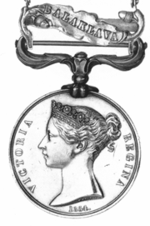Crimea Medal
| Crimea Medal | |
|---|---|
|
Obverse (top left) and reverse (top right) of the medal. Ribbon: 32mm, pale blue with yellow edges. | |
|
Awarded by | |
| Type | Campaign medal |
| Eligibility | British forces. |
| Awarded for | Campaign service. |
| Campaign(s) | Crimean War. |
| Description | Silver disk, 36mm diameter. |
| Clasps | |
| Statistics | |
| Established | 15 December 1854 |
| Related |
Turkish Crimea Medal Baltic Medal |
The Crimea Medal was a campaign medal approved in 1854, for issue to officers and men of British units (land and naval) which fought in the Crimean War of 1854–56 against Russia. The medal was awarded with the British version of the Turkish Crimean War medal, but when a consignment of these were lost at sea, some troops were issued with the Sardinian version instead.[1] The Crimea medal was also presented to certain members of allied French forces.[2]
Design

The medal consists of a 32 millimetres (1.3 in), pale blue ribbon with yellow edges and a 36mm silver disk. It is notable for its unusually ornate clasps. Each clasp is in the form of an oak leaf with an acorn at each end, a style not used on any other British medal. The ornate, floriated, swivelling suspender is also unique to the Crimea Medal.[1]
Five bars were authorised for the medal: Alma, Inkerman, Azoff, Balaklava and Sebastopol. Because Azoff was only issued to Naval and Marine personnel, the maximum awarded to one man was four.[2] A five bar specimen is held in the Royal Collection.[3] The medal was issued without a clasp to those who were active in Crimea, but not present at any of the qualifying actions.
The medals issued to members of allied French forces were often issued with unofficial French bars Traktir, Tchernaia, Mer d'Azoff, and Malakof in addition to the five British clasps.
See also
- Category:Recipients of the Crimea Medal
- Baltic Medal
- Turkish Crimean War medal
- Turkish Order of the Medjidie
- Sardinian Crimea Medal
- Légion d'honneur
- Médaille militaire
- Crimean War medal (disambiguation)
Notes
- 1 2 Christodoulou, Glenn Medals of the Crimean War - Crimean War Research Society (1985)
- 1 2 Joslin, Litherland, and Simpkin 1988, p. 128.
- ↑ "Specimen Crimea medal". Royal Collection. 440655.
Bibliography
- Mackay, J and Mussel, J (eds) - Medals Yearbook - 2006, (2005), Token Publishing.
- Joslin, Litherland, and Simpkin (eds), British Battles and Medals, (1988), Spink
External links
- The Crimean War Medal by Mike Hargreave Mawson
- "The King's Own Royal Regiment Museum, (Lancaster), Crimea Medal". www.kingsownmuseum.plus.com.

